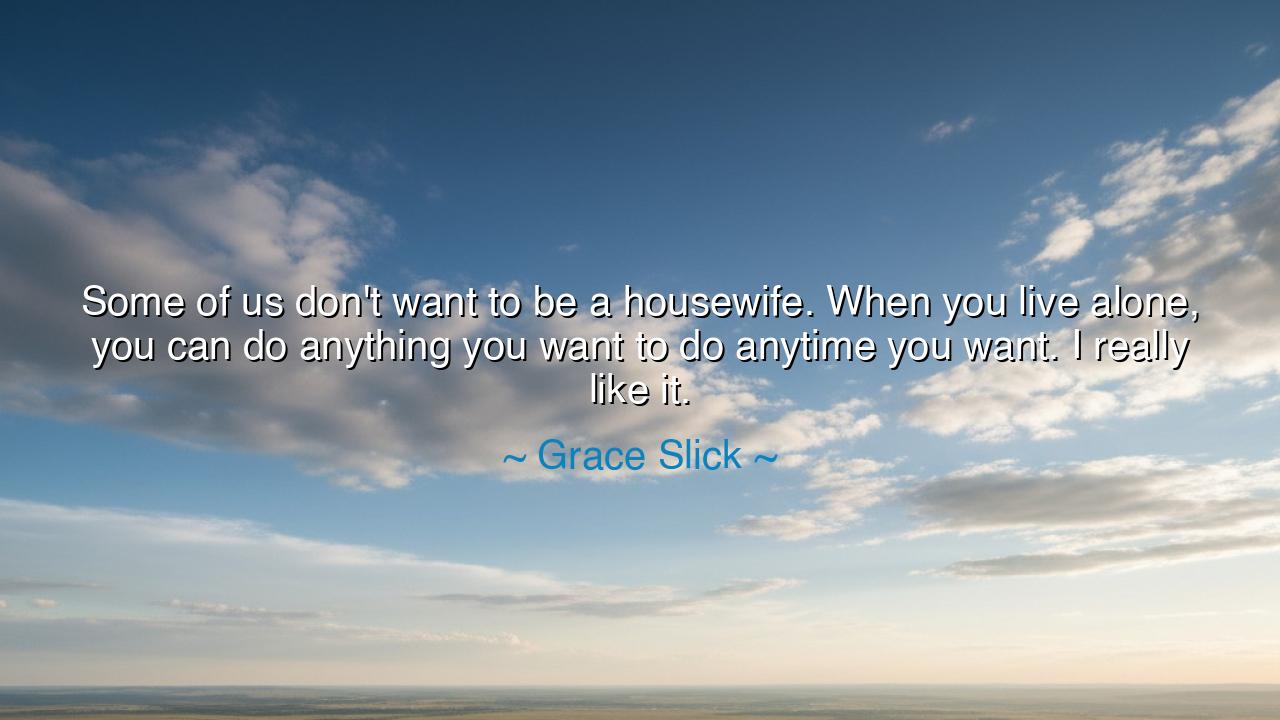
Some of us don't want to be a housewife. When you live alone, you
Some of us don't want to be a housewife. When you live alone, you can do anything you want to do anytime you want. I really like it.






In the fierce and liberated voice of Grace Slick, one of rock music’s most defiant heroines, we hear the cry of a soul that refuses confinement: “Some of us don’t want to be a housewife. When you live alone, you can do anything you want to do anytime you want. I really like it.” These words, though born in the age of guitars and rebellion, carry an ancient resonance — the timeless yearning for freedom, for self-possession, for a life unbound by expectation. Slick’s declaration is not simply about solitude; it is about sovereignty — the right to live according to one’s own rhythm, unshackled by the roles that others would impose.
The origin of this quote lies in a time of transformation. In the 1960s and 70s, when Grace Slick rose to fame with Jefferson Airplane, the world itself was trembling with change. The old orders were cracking — the walls of conformity, the cages of gender, the illusions of control. Women, long confined to the narrow scripts of wife and mother, began to reclaim the power of choice. Slick’s words arose from that revolution — from a woman who chose the stage instead of the hearth, the microphone instead of the broom. Her statement is not a condemnation of domestic life, but a declaration of autonomy: the sacred right to choose one’s own path, even if that path winds alone.
The ancients, too, would have understood the sacredness of such solitude. Diogenes, the philosopher who lived in a barrel, declared that freedom was the only wealth worth having. He scorned the comforts that enslaved the spirit. Sappho, the poetess of Lesbos, sang not of duties but of desire, not of obedience but of love freely chosen. And even among the goddesses, there was Artemis, who roamed the forests untamed, devoted not to husband or home, but to the wild and the moon. Grace Slick’s words carry this same divine fire — the spirit of one who says, “My life belongs to me.”
There is power in living alone, not as an act of rejection, but as an affirmation of selfhood. When one lives without the constant demands of others, time itself becomes one’s ally — the hours stretch wide, the silence becomes full, and every act, from rising to sleeping, becomes an expression of choice. Slick’s joy — “I really like it” — is not the laughter of defiance, but of peace. It is the sound of a woman who has made friends with her own company, who has learned that solitude need not be loneliness, but a canvas for creation.
Consider the life of Virginia Woolf, who wrote that “a woman must have a room of her own if she is to write fiction.” She understood, as Slick did, that independence — both physical and spiritual — is the soil from which creativity grows. Woolf did not despise companionship, but she knew that genius cannot bloom when constantly watered by obligation. Her “room” was not merely a space in a house, but a symbol — the sanctuary of one’s own mind, the freedom to think, dream, and live without interruption. Grace Slick’s life, too, was her room — vast, wild, and self-made.
Yet within Slick’s declaration lies a deeper challenge to all people, not just women: the call to live deliberately. Too often, we build our lives around the expectations of others — parents, partners, societies — and forget to ask what we truly want. To live alone, in the truest sense, is to live authentically, to know oneself, to claim one’s voice. It does not mean isolation, but clarity — a life designed from within, not dictated from without. The housewife, the artist, the wanderer, the leader — all may find fulfillment, so long as they have chosen their way with eyes open and heart awake.
Therefore, my child, take this teaching to heart: do not fear solitude, nor resent freedom. Embrace it as a sacred teacher. Learn to stand on your own ground, to fill your own silence, to hear your own voice above the noise of expectation. You are not made to live by another’s script. Whether you dwell in a house or roam the world, let your choices be your own. For the truest form of love — even love for others — is born from one who has first learned to love their own freedom.
So let Grace Slick’s words be both a song and a warning: “You can do anything you want to do anytime you want.” The world will offer you its chains in beautiful disguises — comfort, approval, belonging — but your soul was meant for the open sky. Live boldly. Choose freely. And when you find yourself alone, remember — you are not lonely; you are free.






AAdministratorAdministrator
Welcome, honored guests. Please leave a comment, we will respond soon